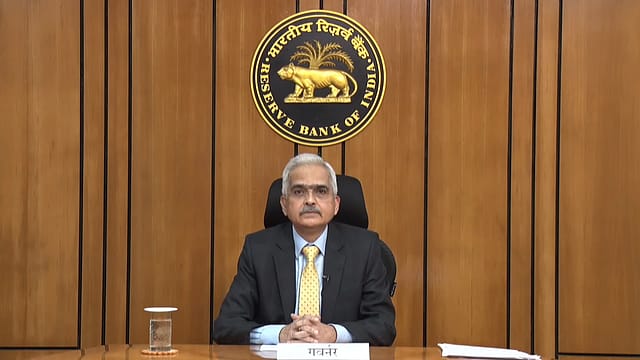RBI defers implementation of FX rules to May 3
ADVERTISEMENT

The Reserve Bank of India (RBI) on Thursday deferred the implementation of new rules for foreign exchange (FX) derivatives traded on stock exchanges to May 3, 2024, from April 5, 2024, earlier.
The RBI's decision to postpone the deadline comes after receiving feedback from the industry stakeholders. In its directions issued today, the central bank says the regulatory framework for ETCDs has remained "consistent" over the years and that there is no change in the RBI’s policy approach.
"The A.P. (DIR Series) Circular No. 13 dated January 05, 2024 had stated that these comprehensive and consolidated Directions shall come into effect from April 05, 2024. In view of feedback received and recent developments, it has been decided that these Directions will now come into effect from Friday, May 03, 2024," the central bank says in its latest circular.
The RBI's new rule related to FX currency derivatives is aimed at curbing speculative trading. However, it made market participants anxious as they feared it would significantly impact trading volumes. Industry stakeholders, including Zerodha founder Nithin Kamath, had flagged issues with the new RBI rule, saying the “regulatory risk is by far the biggest risk” for stock brokers.
January 2026
Netflix, which has been in India for a decade, has successfully struck a balance between high-class premium content and pricing that attracts a range of customers. Find out how the U.S. streaming giant evolved in India, plus an exclusive interview with CEO Ted Sarandos. Also read about the Best Investments for 2026, and how rising growth and easing inflation will come in handy for finance minister Nirmala Sitharaman as she prepares Budget 2026.
"The RBI has its own reasons for restricting unhedged currency derivatives, but this means the death of currency derivatives trading on stock exchanges by retail traders," Kamath said via micro-blogging platform X.
The apex bank says the regulatory framework for participation in ETCDs involving the Indian rupee (INR) is guided by the provisions of the Foreign Exchange Management Act (FEMA), 1999. The rules framed under this law mandate that currency derivative contracts involving the INR – both over-the-counter (OTC) and exchange-traded – are permitted only for "hedging" of exposure to foreign exchange rate risks, the RBI says.
It says the regulatory framework in the Foreign Exchange Management (Foreign Exchange Derivative Contracts) Regulations, 2000, also says a person may enter into an ETCD contract involving the INR only for the "purpose of hedging a contracted exposure".
The RBI's June 20, 2014, circular had emphasised on the ease of doing business, which permitted users of ETCDs to take positions up to $10 million per exchange without having to provide documentary evidence to establish the underlying exposure but did not provide any exemption from the requirement of having the exposure. Accordingly, users were expected to ensure compliance with the requirement of having underlying exposure. The limit of $10 million per exchange was subsequently amended to a single limit of $100 million combined across all exchanges.
The RBI's Developmental and Regulatory Policies on December 08, 2023, stated the regulatory framework governing the hedging of foreign exchange risks was comprehensively reviewed to usher in a principle-based regime. Based on this review, public consultations, feedback received from market participants and experience gained since then, the regulatory framework was made more comprehensive in respect of all types of transactions – OTC and exchange-traded - under a single master direction to enhance operational efficiency and ease access to foreign exchange derivatives.
The latest directions issued by the RBI on January 05, 2024, set out these master directions and reiterated the regulatory framework for participation in ETCDs involving the INR without any change. Accordingly, participants with a "valid underlying contracted exposure" can continue to enter into ETCDs involving the INR up to a limit of $100 million, without having to produce documentary evidence of the underlying exposure, says the RBI.
